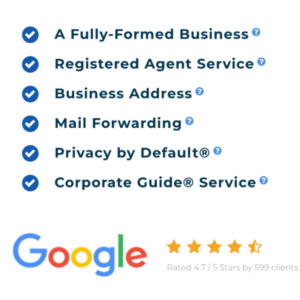How to Start a Handyman Business: Escape Your 9 to 5 With a Trade

When you buy something through one of the links on our site, we may earn an affiliate commission.
So, you want to break free of the 9 to 5 grind, be your own boss and learn how to start a handyman business!
That’s an admirable goal, and you’ve come to the right place for some advice.
This article will discuss what you should consider and understand about how to start a handyman business. We'll look at what you need to do before you launch, the legal aspects of the handyman industry, how to find the right customers, how to price your services, and much more.
Let’s get started.
Contents
- Research to do Before You Start
- Learn About the Laws Governing Handyman Businesses
- Decide What Services You Can Offer
- Define Your Target Market
- Set your pricing
- Create Your Business Plan
- Administrative Tasks
- Set up the Business as a Legal Entity
- Set up a Business Bank Account
- Don’t Forget the Paperwork
- Use Software To Help You Run Your Business
- Give your Business a Name
- Get Your Website Up and Running
- List on Google
- Create Free Directory Listings and Profiles
- Join Local Business and Networking Groups
- Stay Current
- Request Reviews
- The Importance of Customer Service
- Liability Insurance Needs
- How to Start a Handyman Business: Funding Options
- Final Thoughts on How to Start a Handyman Business
Research to do Before You Start
Research everything you can think of. There’s tons of useful information on the net covering every aspect of starting your own handyman business.

Even though you may be highly motivated to start your handyman business immediately, you might want to spend a few months working for a handyman company. Doing this can give you firsthand experience regarding the benefits and difficulties of starting your own business.
You could get some insightful and valuable information on practical matters, such as planning your day, where to find the best supplies, invoicing clients, and getting paid.
Consider Buying A Franchise (it's possible there are franchises under $5k). Handyman franchises can be successful if their processes work well. It is beyond the scope of this article to dig deeper into the subject, but this avenue is worth exploring.
Make Sure There’s Demand for Your Services
One of the biggest mistakes handymen make is not figuring out if there is a need for their services where they intend to set up shop. So, doing extensive market research before beginning any other tasks related to setting up your new business is essential.
Investigate the market for local handyman businesses (also true for when you choose your handyman business slogan). Learn as much as possible about the local customer base and other handymen, contractors, and organizations.
Check out the Competition
Get to know your competition. Make an effort to get an understanding of the kinds of homes or buildings they service. Find out whether they specialize in particular houses or buildings or if their services are more general. And what services they provide.
Calling them for a price quote is a smart option if they don't offer an approximate pricing range on their website.
While you’re on their websites or looking at their business profiles on Google My Business, look at customer reviews. You can quickly learn what’s been done right and wrong while also conducting customer research and gathering information.
This will be very helpful when you design your business and choose marketing techniques in the future.

Are There Suppliers In Your Target Area?
Look for building and maintenance suppliers. You'll want to find companies that supply in bulk and at better prices, close to your target areas. The people who work there are usually full of information. They’ll be able to tell you where to find special supplies etc.
Once you’re closer to launching your business, make an effort to meet the management. If you need to open an account, approaching owners of businesses who know you could smooth the way.
Learn About the Laws Governing Handyman Businesses
You don’t want to be penalized and have your reputation damaged due to breaking the law. So, before offering specific services to your clients, you must be aware of any licenses and certificates you need. For instance, in some jurisdictions, contractor licenses are required before HVAC, plumbing, or electrical work is performed.
Many states demand a formal license for you to legally operate and do business as a handyman. For information on the conditions in your state, check with the National Contractors License Service.
Study your state's contractual regulations. You’ll need to identify which services you can and cannot offer without a license. Check the licensing requirements for the services you wish to provide.
If you go to the website of your state's contractors' board, you can get a pretty good understanding of the legislation. Also, you will need a catchy name for your business. Have a look for ideas in our list of 1051 contractor names . They typically offer a handyman-specific FAQ section that outlines the legislation governing minor maintenance and repairs.
Handyman License Requirements
The qualifications required to become a handyman depend on your state of residence, and its criteria will determine how long it takes you to obtain your handyman license. Some states don't have special requirements so that you can start immediately.
Some states, for instance, need one or more of the following:
- Passed a trade, business, or legal exam.
- Two years minimum experience in general handyman work
- Proof of insurance
- Completion of educational curriculum designated by the state
- Getting registered with the contracting board or labor department in your state
- Proof of having worked as an apprentice handyman
It is advisable to review the handyman laws and ordinances in your city or town. Some jurisdictions have additional standards beyond those set by the state.

Handyman License Costs
Depending on the services you plan to offer and the licensing requirements in your state, handyman licensing might cost hundreds or thousands of dollars, depending on the types of services you intend to provide.
You'll typically pay between $200 and $350 to take the exam in states where you just need to pass one exam. Plus, an additional $100 to $200 to get your license.
Some states could charge you extra for bonds or insurance, which you must purchase before submitting your application.

Do You Need Training to Qualify as a Handyman?
You are not necessarily required by law to have any formal training before beginning your career as a handyman. But there are a few things you can do to streamline the process of starting a handyman business:
- Take a DIY course at college. These courses don't have specific entry requirements. And there are many ways to pay for them, including bursaries or an Advanced Learning Loan if you're older than 19.
- Consider entering an apprenticeship; to become a handyman apprentice, you must have some GCSEs (General Certificate of Secondary Education.)
Once you have qualified, think about becoming a certified handyman professional. The Association of Certified Handyman Professionals offers a great program.

Get an Employer Identification Number (EIN)
This is also known as a Federal Tax Identification Number. An EIN is a distinct nine-digit number that serves as your company's tax identification number.
You will require an EIN as a business owner to create a business bank account, submit business license applications, and file your tax returns. Apply for one as soon as you begin your business planning.
The easiest way to obtain an EIN is through the IRS EIN Assistant's online application process. This service is provided free of charge.

Decide What Services You Can Offer
Now that you have a basic understanding of what services the handyman companies offer in your selected area, you can decide what services you will offer. And make sure you’re skilled at every service you’ll be offering.
Your range of services as a handyman can cover a variety of skills, but you don't have to be able to do everything. Even if you only offer a limited range of services, you can still make a good profit.
Define Your Target Market
Choosing the right customers will greatly impact your enjoyment and earnings as a professional handyman. You'll be happy, they'll be happier, and you'll make more money, get more referrals and repeat business.
Your target market must also represent people willing to pay reasonable amounts for your services.
Do your research on the following:
- What area do you want to work in?
- Are there individual homes or condos in this area?
- What is the income bracket?
- Do you serve individual homeowners or companies (like estate agents)?
Determine your target market by considering the jobs you intend to take on and the clientele you find yourself drawn to.
One typical market is older retired people who live alone. They frequently lack the necessary energy to do most home repair jobs but are prepared to pay to hire an honest, diligent handyman.

Set your pricing
One of the most challenging aspects of starting a handyman service is figuring out how much to charge. What you must charge to truly make a profit will be a process of setting, testing, and revising your business plan.
A good business plan will consider all the factors needed to calculate your pricing.
The handyman rate per hour is a typical and well-known method of estimating job costs.
Create Your Business Plan

Your business plan is the foundation of your company. It's more than just a document for potential investors to review and decide whether or not to fund your project.
It's your business roadmap. Putting your plans in writing helps you decide on your destination and create a route to where you want to be.
There are plenty of free business plan templates available on the net. They can help you structure your document. Try Shopify, and Hubspot templates. And you can also download a free handyman’s business plan.
A typical business plan will usually have the following elements.
- Business description
- Market analysis
- Competitive research
- Organizational management description
- An explanation of the services
- Marketing strategy
- Funding information (or request for funding)
- Financial estimates. Include your initial investment (tools, vehicle and premises etc.) And operational costs.
- Projected Income
Having your financial calculations in a spreadsheet makes adjustments easy.
Unless you're planning to try and get a business loan, don't get too hung up on perfecting your business plan. It's there for you to clarify everything about the business idea you're planning to start and build.
Here is an article you may find helpful as you learn how to start a handyman business: How to pay yourself as a business owner.
Administrative Tasks
There are a few more important tasks before you launch your new handyman business.
Set up the Business as a Legal Entity
The three small business structures are sole proprietorship, limited liability company (LLC), and partnership.
Register the company: To register your handyman business, visit your local registry or utilize a program for online company registration. You must pay the registration fee for your new firm and trademark your company name.
Pick a Business Structure. You have three business registration options in the United States: sole proprietorship, partnership, and limited liability company (LLC).
It’s best to use the services of experts in setting up an LLC, for example, Northwest Business Formation. They’ll help you with the legalities and provide you with the right documentation.
Set up a Business Bank Account
You should first talk to several banks about your requirements and understand their services and fees. Once you choose, you may begin the account opening procedure online or by visiting a nearby branch.
Although the details vary from bank to bank, new customers typically need to visit the bank in person and submit their papers. Contact the bank and find out what documents you need to open the account and if you need to make an initial deposit.
Don’t Forget the Paperwork
As you learn more about how to start a handyman business, you will discover that running your business means paperwork. You have to send out invoices and make sure you get paid. Taxes need to be handled, and so on.
If you're not good at doing the paperwork, find someone to help as soon as possible. Otherwise, you may find yourself spending 80% of your time doing the work you're no good at. And only 20% doing what you wanted to do when you started your business.
Think about enrolling in an online or in-person business course. The knowledge you gain will benefit you for a long time.
The United Handyman Association can advise on managing your business effectively. They can also help with standard startup requirements like insurance and legal support.

Use Software To Help You Run Your Business
Even if you spend the day working with your hands as a handyman, you still need to use some critical apps and software.
Let's briefly look at some you could use since the entire point of apps and software is to make your life easier.
- Since you are a legal entity (registered business), you must manage your finances and issue bills to your customers. Online billing software such as Maxio Billing, InvoiceBerry, and BellaSFM can help significantly. There is plenty of billing software available - both free and paid.
- You'll need a credit card app so your clients can pay you with a credit card.
- Evernote makes taking notes simple. You can create lists for your tasks, take notes as you work on a quote, or easily make lists of supplies you need.
- There are plenty of Customer Relationship Management tools for handyman businesses. Housecall Pro and Jobber are two that have high usage and good ratings

This is a vital area to focus on. If no one knows about you, who will use your services? Word-of-mouth could be your primary source of business, but it only gets you so far. Your website will give you credibility, so that's a good start.
Make sure your business card is well-designed and easy to read. You could also consider electronic business cards. That way, you can just email your card to a potential customer. Read about the 16 best digital business card apps to make networking easier.
Give your Business a Name
Choosing the perfect name for your business can be difficult, but it's essential. Before you register your business name, do some research on it by checking the following:
- Your state's business records
- Federal and state trademark records
- Social media platforms

If it's an HVAC company you are starting, be sure to check out our extensive list of ideas for HVAC company names.
Get Your Website Up and Running
Every reputable company has a website, and it makes no difference what size it is or what industry it is in.
Social media profiles for businesses like Facebook or LinkedIn are not a substitute for a website.
You could use a website builder like Squarespace. Squarespace is a hosted solution; you do not require coding skills to set up your website.
Or you could create your website yourself.
If you do, secure your domain name first. Namecheap is perfect for registering your domain name. If you need help, here is an article on how to choose a domain name for your website.
Next, you will need a website host, and Iridium is great and won’t break the bank.
Choose a lightweight theme like GeneratePress or Astra for your WordPress website.
If you want to focus on your website and need full-on training, you can join The Authority Site System with a 40% discount. TASS will help you build an authority website that will shoot you ahead of the competition!
And in terms of assessing competition, local SEO, and even deciding what services to offer based on finding out what people in your location are looking for, Semrush is the perfect tool.
Your Handyman business website will help you stand out, encourage consumer loyalty, and increase business. It must have information about your services, a work request form, client endorsements, and license details.
Take pictures of some of your best work and put them on your landing page.
List on Google
Google Business Profile is a great strategy to boost your presence across Google services. You can create a free business listing and include information and images about your company's location and services. Google Search and Maps may show information from your Google Business Profile.
Want to know more? Read about optimizing your Google maps listing to increase local search rankings.

Create Free Directory Listings and Profiles
Below is a list to get you going. Please note: you'll get emails and calls from sales reps hustling to get you to sign up for advertising. It’s just the way it goes.
- GMB (Google My Business as per above)
- Bing Business
- Yelp (use the free profile option – from an SEO perspective, it's worth it.) Yelp is one of the best review websites for promoting local companies.
- Houzz
- Angi (formerly Angie’s List)
- HomeAdvisor
- Nextdoor
- Manta
Join Local Business and Networking Groups
A solid referral network is the most dependable, long-lasting source of leads. Make a name for yourself with influential people in the area, such as business owners and other community leaders. Some great places to start:
- Join as an "affiliate member" with the Realtor Association in your community.
- Networking groups (such as BNI)
- The local Chamber of Commerce
Stay Current
- Update your social media postings as often as you can.
- Comment on other projects you see on the platforms, especially in your area.

Request Reviews
Nothing motivates folks to hire you like a positive customer review. At first, it may feel like a hassle, but getting reviews from your clients is crucial. Request that they do the following:
- Email you a recommendation that you can post on your website.
- Post a review on a website like Google Business or Yelp
- Post a review on any third-party organizations where you have a profile, such as Houzz, HomeAdvisor, Angie's List, etc.
- Talk about your business on Facebook or Instagram.
Customers willing to pay for high-quality services are more likely to use businesses with consistently positive reviews. The opinions of your customers matter a lot.
Try and respond to your customers' reviews. And if they are negative, respond immediately and then fix the problem (if you can).

The Importance of Customer Service
How you handle customer service will either make or break your new business. There is so much competition in the handyman industry that people will choose the handyman with the best attitude. And the willingness to resolve any issues.
If your customers know you care about them, you will be their go-to guy. And recommend you to their friends and family members.
Liability Insurance Needs
Liability insurance is a necessary expense. Shop around for the best deal. And consider the following:
- Are clients asking if you have general liability insurance?
- Does your state or territory require it?
- Will you be working for or in apartment buildings owned by banks?
- Is the job inherently dangerous, or does it require you to wear a helmet?
- Can you afford to pay for damages that may occur?
Handyman insurance is pretty important. When you work in someone's home, you are liable for any damages as a result of your work.
Business insurance will safeguard both your company and yourself. It can cover any work-related illnesses, accidents, and property damage you or your personnel may have while on the job.
You may be required to have Workman's Compensation insurance if you have employees.
How to Start a Handyman Business: Funding Options

The ideal method to get finance for your company depends on several variables, including creditworthiness, the required sum, and the options available.
- Commercial loans. A commercial loan from a bank is a good place to start if you need money. However, these are frequently challenging to obtain.
- The US SBA (Small Business Administration) is another place to apply for a small business loan.
- Business Grants are comparable to loans but do not require repayment. These types of grants frequently have strict requirements that must be met for the company to be considered. And there is stiff competition to get them.
- Government funds, grants for women-owned enterprises, and grants for minority-owned firms are available options.
- A handyman startup that needs a sizable upfront investment may try to enlist an investor. Investors may contribute to a startup company in exchange for shares.
- Alternatively, you may start an equity crowdfunding campaign to get support from many people for less money.
- Loans from family or friends.
- ROBS (Rollover for new businesses) This is where a potential business owner may use their retirement savings to pay the costs needed to start a new company.
The SBA (Small Business Association) provides free training on funding opportunities and programs.
Final Thoughts on How to Start a Handyman Business
The handyman industry is estimated to be worth $4 billion. It is expanding, and demand is rising for a wide range of domestic services as the number of homes increases.
The decision to learn how to start a handyman business is the first step, and it's a big one.
Growing a small business is challenging, especially if you are a more hands-on person. Take your time and do the research and foundation work to get your business up and running. Gradual strategic choices can often result in long-term, sustainable success.
We hope our tips in this article will help you establish a successful handyman business and wish you the best of luck in your new adventure!
Want to learn step-by-step how I built my Niche Site Empire up to a full-time income?
Yes! I Love to Learn
Learn How I Built My Niche Site Empire to a Full-time Income
- How to Pick the Right Keywords at the START, and avoid the losers
- How to Scale and Outsource 90% of the Work, Allowing Your Empire to GROW Without You
- How to Build a Site That Gets REAL TRAFFIC FROM GOOGLE (every. single. day.)
- Subscribe to the Niche Pursuits Newsletter delivered with value 3X per week
My top recommendations

















